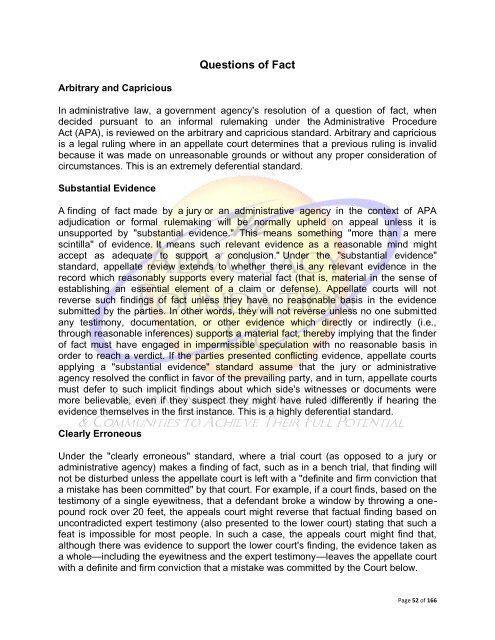Create successful ePaper yourself
Turn your PDF publications into a flip-book with our unique Google optimized e-Paper software.
Questions of Fact<br />
Arbitrary and Capricious<br />
In administrative law, a government agency's resolution of a question of fact, when<br />
decided pursuant to an informal rulemaking under the Administrative Procedure<br />
Act (APA), is reviewed on the arbitrary and capricious standard. Arbitrary and capricious<br />
is a legal ruling where in an appellate court determines that a previous ruling is invalid<br />
because it was made on unreasonable grounds or without any proper consideration of<br />
circumstances. This is an extremely deferential standard.<br />
Substantial Evidence<br />
A finding of fact made by a jury or an administrative agency in the context of APA<br />
adjudication or formal rulemaking will be normally upheld on appeal unless it is<br />
unsupported by "substantial evidence." This means something "more than a mere<br />
scintilla" of evidence. It means such relevant evidence as a reasonable mind might<br />
accept as adequate to support a conclusion." Under the "substantial evidence"<br />
standard, appellate review extends to whether there is any relevant evidence in the<br />
record which reasonably supports every material fact (that is, material in the sense of<br />
establishing an essential element of a claim or defense). Appellate courts will not<br />
reverse such findings of fact unless they have no reasonable basis in the evidence<br />
submitted by the parties. In other words, they will not reverse unless no one submitted<br />
any testimony, documentation, or other evidence which directly or indirectly (i.e.,<br />
through reasonable inferences) supports a material fact, thereby implying that the finder<br />
of fact must have engaged in impermissible speculation with no reasonable basis in<br />
order to reach a verdict. If the parties presented conflicting evidence, appellate courts<br />
applying a "substantial evidence" standard assume that the jury or administrative<br />
agency resolved the conflict in favor of the prevailing party, and in turn, appellate courts<br />
must defer to such implicit findings about which side's witnesses or documents were<br />
more believable, even if they suspect they might have ruled differently if hearing the<br />
evidence themselves in the first instance. This is a highly deferential standard.<br />
Clearly Erroneous<br />
Under the "clearly erroneous" standard, where a trial court (as opposed to a jury or<br />
administrative agency) makes a finding of fact, such as in a bench trial, that finding will<br />
not be disturbed unless the appellate court is left with a "definite and firm conviction that<br />
a mistake has been committed" by that court. For example, if a court finds, based on the<br />
testimony of a single eyewitness, that a defendant broke a window by throwing a onepound<br />
rock over 20 feet, the appeals court might reverse that factual finding based on<br />
uncontradicted expert testimony (also presented to the lower court) stating that such a<br />
feat is impossible for most people. In such a case, the appeals court might find that,<br />
although there was evidence to support the lower court's finding, the evidence taken as<br />
a whole—including the eyewitness and the expert testimony—leaves the appellate court<br />
with a definite and firm conviction that a mistake was committed by the Court below.<br />
Page 52 of 166

















